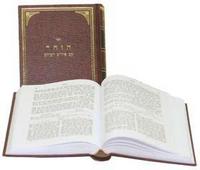Permission to Reveal
Rabbi Shimon Bar-Yochai had an exquisite treasure in his hands and wanted to share it with the world. Yet, he was also afraid that if it fell into the wrong hands, it would create corruption. Today, we are permitted to touch The Zohar.
“Rabbi Shimon sat and wept. He said, ‘Woe if I reveal; woe if I do not reveal.’ If he did not reveal, the innovations in the Torah would be lost; and if he did reveal, perhaps one who is unworthy of the secrets of the Torah would hear?”
--The Book of Zohar, Naso, Idra Rabah
Kabbalists have always sought a way to reveal the method to achieve perfection to the people. But passing the method on to others is a complex matter, and Kabbalists had to innovate in order to overcome various obstacles.
This essay in The Zohar describes Rabbi Shimon Bar-Yochai’s internal conflict. He yearned to tell the world about the wisdom of Kabbalah, but feared being misunderstood. To understand why revealing the wisdom of Kabbalah was such a complicated matter, we must first know one of the biggest secrets: the true meaning of the word “Torah.”
The Spice
“Rabbi Shimon said, ‘Woe unto one who says that the Torah comes to tell literal stories. Rather, all the words of the Torah are sublime matters and sublime secrets.’”
--The Book of Zohar, BeHa’alotcha
The Book of Zohar tells us that the Torah is not a collection of historic episodes or earthly moral codes. Instead, it is written, “I have created the evil inclination, I have created for it the Torah as a spice, because the Light in it reforms it.”
Kabbalists explain that the Torah is a special force, a “spice,” whose role is to help us realize the purpose of Creation—to transcend the ego, the evil inclination, and equalize with the Higher Force of reality, the force of love and giving. To begin with, the Torah was given to us for that single purpose.
A Treacherous Addition to the Ego
The Torah has a unique characteristic: it can do good, but it can also do harm. If used correctly, with the aim to equalize us with the Upper Force, the Torah elevates us to a new life. However, if we engage in it without this intent, the Torah does harm. This is why it is written, “Rewarded—it becomes a potion of life to him; not rewarded—it becomes a potion of death to him” (Masechet Yomah, 72b).
“Potion of death” means that the Torah evokes additional egoism. That is, besides the corporeal egoism we all possess, it adds a spiritual ego, too. This added ego causes people to consider themselves righteous and think that they should be rewarded by the Creator and by others in this world and in the next. They believe that their place in heaven is guaranteed. This was what Rabbi Shimon feared.
Rabbi Shimon’s purpose was to deliver the wisdom of Kabbalah only to those with a genuine need to correct themselves to similarity with the Creator. Yet, he was afraid that the wisdom of Kabbalah would suffer the same fate as that of the Torah, that it would become a means to obtain honor, wealth, and power. He feared that people would think that it possessed nothing more than literal stories. For this reason, Rabbi Shimon Bar-Yochai (Rashbi) wrote his sacred book in a special code, and knew that The Zohar would have to be hidden for many centuries, until the generation was worthy.
Happy Are Those with a Question in Their Hearts
“Rabbi Shimon lifted up his hands and wept, and said, ‘Woe unto one who would be at that time, and happy is one who would be, and could be at that time.’ And he interprets, ‘Woe unto one who would be at that time because when the Creator comes to call upon the deer, He will examine all the actions of every person… Happy is the one who will be at that time because he will be awarded that Light of the King’s delight.”
--The Book of Zohar, Exodus
In its picturesque style, The Book of Zohar tells of Rashbi’s forward gaze, weeping for the days to come at the end of the exile. In those days, he knew, it would be necessary to disclose the wisdom of Kabbalah to realize the purpose of Creation. However, Rashbi also knew that some people would misuse it, and this pained him.
Rashbi was hurt by the thought that people who grew accustomed to improper use of the Torah, or were brought up to suppress their deepest questions, would approach Kabbalah with that same attitude. It is about those people that he says “Woe,” but he immediately adds that there will be many others who, through the wisdom of Kabbalah, will achieve a great Light.
“Happy” are the people in whom the question about life’s meaning will awaken. This is because this question will bring them to the Light that reforms, hidden in the books of Kabbalah. Then, “when the Creator comes to call upon the deer,” (when the Upper Light comes to fill the souls), these people will be able to rejoice in the King’s delight.
Climbing the Ladder Together
In our generation, we have already been given The Sulam (Ladder) Commentary on The Book of Zohar. The Sulam commentary is the first and only commentary that lets us aim correctly in the study of Kabbalah. By allowing us to cultivate the right intention, this commentary helps us discover the treasure that Rashbi hid for us in The Zohar. As its name, Sulam, implies, this commentary is a ladder to climb to the eternal, perfect, and sublime state that awaits us all.
